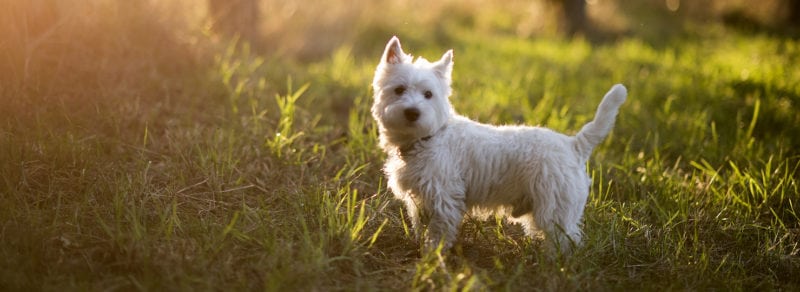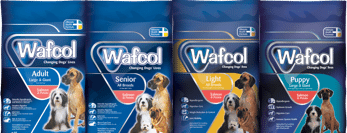West Highland White Terrier’s, more commonly known as the ‘Westie’, are one of the most popular breeds in the ‘Terrier’ group. Their lively temperament and high self-esteem makes them an entertaining breed for any household and they are often accused of being big dogs trapped inside a little dog’s body.
As the name suggests the West Highland White Terrier descends from a group of Scottish National Breeds including the Scottish Terrier and the Cairn. In fact, the Westie breed was developed from Cairn terrier ancestry and the white strain of Cairns was bred in the mid-19th century. The West Highland White became a little shorter in the body with a higher tail carriage than its ancestor.
Breed Characteristics
The Westie was originally bred for hunting vermin, meaning they are built to be extremely brave and tough, pursuing the likes of foxes, badgers, rats and otters. This is where the breed has gained its high self esteem and ‘happy-go-lucky’ nature from. The West Highland Terrier is a friendly and happy dog, with a lively nature and rather a loud voice – a typical trait within the terrier breeds.
West Highland White Terriers are keen learners and can be trained fairly easily, meaning they are a popular breed when competing. Devon, also known as Burneze Geordie Girl, was the ‘Best in Show’ winner at Crufts 2016 and is fed a Wafcol diet. Read more about Devon’s story here.
The breed is a fantastic choice for multi-dog homes, or homes with cats – if brought into the family as a puppy. We advise that Westie’s aren’t brought into homes with small animals, as their breed background traits mean that there are likely to chase pet animals such as rabbits, hamsters and guinea pigs.

Breed Bio
Breed Group: Terrier
Size: Small – 8kg/10kg on average
Recommended Grooming: Once a week
Average Lifespan: Over 12 years
Common Sensitivities: Grain allergies with triggers such as; rice, bulgur, corn, wheat, wheat gluten, barley, rye, oats and many more
Common Symptoms to Sensitivities: Itchy skin, ear inflammation, licking front paws, rubbing face on carpet, vomiting, diarrhoea, flatulence, sneezing and any behavioural changes
To learn more about common symptoms of dietary sensitives in dogs and how to use an exclusion diet to treat them, take a look at our article ‘Is My Pet Sensitive?’
You May be Wondering…
Which Wafcol recipe should I be feeding my West Highland White Terrier?
Wafcol Adult Salmon & Potato for Small and Medium breeds is perfect for Westie’s with sensitivities as it is grain free. The food is also fantastic for keeping their medium length, course coat, nice and white.
Am I able to feed my puppy Wafcol dog food?
Yes. Wafcol Puppy Salmon & Potato for Small and Medium breeds is great if your West Highland White Terrier puppy is showing signs of dietary sensitivities.
How much dry kibble should I be feeding my Westie each day?
The average weight of a West Highland White Terrier is between 8 and 10kg. We recommend feeding small dogs weighing under 10kg up to 200g of kibble per day.


